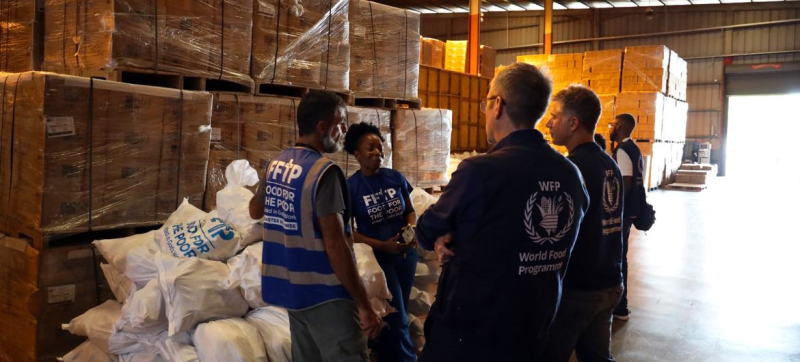- Logi-boitha of 2006 was the 1st reflection of Hasina’s fascism: Rizvi |
- Economists express concern over bank merger; BB remains confident |
- No response on request for Hasina’s extradition: Touhid Hossain |
- Deep relations with US, economic ties with China: Touhid |
- Recommendations on July Charter implementation submitted to CA |
Jamaica Braces for ‘Catastrophic’ Hurricane Melissa

World Food Programme workers discuss the distribution of aid in a warehouse in Jamaica.
Millions in Jamaica and across the Caribbean are bracing for the massive impact of Hurricane Melissa on Tuesday, as the UN and its partners warn of a “severe” and “immediate” threat.
Briefing reporters just hours before Melissa’s expected landfall in Jamaica, a representative of the International Federation of Red Cross and Red Crescent Societies (IFRC) said the Category 5 system “will be the strongest on the planet this year,” putting a million people at direct risk, “including families still recovering from Hurricane Beryl,” which struck the island nation only 16 months ago.
“Roofs will be tested. Flood water will rise. Isolation will become a harsh reality for many,” said Necephor Mghendi, IFRC’s Head of Delegation for the English and Dutch-speaking Caribbean.
‘Total Structural Failure’ Likely
“Total structural failure is likely,” said Anne-Claire Fontan, a tropical cyclone specialist with the World Meteorological Organization (WMO), quoting the United States National Hurricane Center in Miami.
“I have never seen this sentence before… it’s a massive impact that is expected in Jamaica,” she said.
Sustained winds of 280 kilometres per hour have been reported as the system moves westward towards Jamaica on Tuesday morning. Heavy rains continue across the region, with deaths already reported in Haiti, the Dominican Republic, and Jamaica.
Ms. Fontan explained that the system will bring three times the normal monthly rainfall for Jamaica—up to 700 millimetres (27.5 inches).
Catastrophic Flooding and Landslides
“It means there will be catastrophic flash flooding and numerous landslides,” she warned. “In addition to rain and destructive winds, storm surges are expected along Jamaica’s southern coast, rising three to four metres high, accompanied by large waves.”
Speaking from Port of Spain in Trinidad and Tobago, the IFRC’s Mr. Mghendi said that while Melissa is moving at a very slow speed—approximately six kilometres per hour—the “extreme” rainfall and winds are expected to cause “extensive infrastructure damage, isolating communities and cutting off essential services for days, if not weeks.”
“The humanitarian threat is severe, and it’s immediate,” he said.
Communities Still Rebuilding from Beryl
Many families are still rebuilding from the impacts of Hurricane Beryl last year and restoring their livelihoods.
“Melissa now threatens the same communities, and many of these recovery efforts could be wiped out,” he warned. “This is an example of how extreme climate events can deliver shocks to communities and stretch their capacity to withstand them.”
The IFRC official stressed that coastal communities remain financially strained, while informal settlements are at high risk from intense winds and saturated soils, increasing the likelihood of landslides.
Evacuations and Shelter Preparedness
“The first order of business is to save as many lives as possible,” said Jens Laerke, spokesperson for the UN Office for the Coordination of Humanitarian Affairs (OCHA). “That’s why we’re seeing evacuations, shelters being set up, and advisories going out.”
In Jamaica, authorities have prepared around 800 shelters, and IFRC volunteers are assisting with evacuations, distributing relief supplies, and reinforcing early warning messages.
UN Agencies Step Up Preparedness
OCHA spokesperson Mr. Laerke added that an anticipatory mechanism facilitated by the UN has been activated in Cuba and Haiti, both in the hurricane’s projected path. This has triggered a $4 million allocation from the UN Central Emergency Response Fund (CERF) to pre-position food, water, hygiene items, and health supplies.
“What people will need most are food, clean water, shelter, and medical care,” he said, noting that massive flooding often leads to shortages of clean water and increased health and epidemic risks.
Asked about the availability of relief items, the IFRC’s Mr. Mghendi said that within Jamaica, enough supplies have been pre-positioned to provide immediate assistance to 800 households, with additional supplies for 60,000 households ready for delivery to Jamaica and nearby countries like the Bahamas “within four hours.”
Global Solidarity Urged
“After we release these supplies, there will be a need for replenishment—and that’s where we’re hoping for global solidarity,” Mr. Mghendi said.
“In events like this, the world comes together, and we anticipate this will be the case. This is one of the storms of the century, and I believe the global community will respond collectively,” he concluded.

